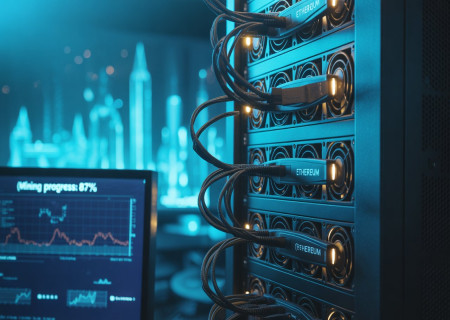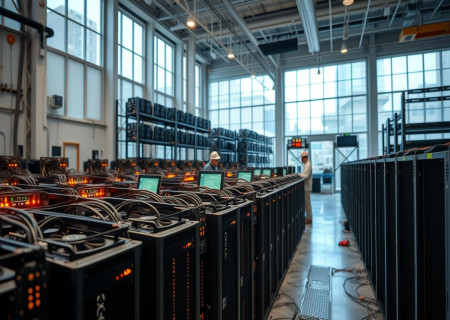
- July 23, 2025
- 6 months ago
Cryptocurrency mining has evolved into one of the most intriguing ways to grow assets in the digital era. By harnessing computational power to secure networks and validate transactions, miners earn rewards in the form of cryptocurrencies like Bitcoin or Ethereum. But here’s the catch—there’s more than one way to approach mining. Two popular methods are home mining, where you manage the process yourself, and cloud mining, where a service provider handles the technical complexities for you.
If you’re considering dipping your toes into mining but aren’t sure whether to get hands-on or take a hands-off approach, this guide will walk you through the differences, pros, cons, and deciding factors that will help you choose the right path.
What Is Cryptocurrency Mining and Why Does It Matter?
Cryptocurrency mining is the lifeblood of many decentralized networks. At its core, mining involves solving complex mathematical puzzles to validate and process transactions on a blockchain. Successful miners are rewarded with cryptocurrency tokens, making mining both a way to secure the network and earn assets.
Mining plays two critical roles:
- Security: Miners ensure transactions are legitimate and prevent double-spending.
- Token Distribution: Mining serves as a mechanism to release new cryptocurrency tokens into circulation.
For individual participants, mining represents an exciting opportunity—earning rewards while contributing to the decentralization of digital finance. But your choice of mining method will significantly impact your experience and profitability.
Home Mining: Taking Control of Your Setup
What Is Home Mining?
Home mining is when you personally set up and maintain the hardware needed to mine cryptocurrencies. This method allows you to directly control your equipment, giving you full flexibility to choose which cryptocurrencies to mine and how to operate your setup.
What You’ll Need for Home Mining
- Mining Hardware: Specialized devices like ASICs (Application-Specific Integrated Circuits) or GPUs (Graphics Processing Units) are essential for efficient mining. ASICs are particularly powerful for coins like Bitcoin.
- Electricity Access: Mining consumes significant amounts of electricity, so access to affordable energy is crucial.
- Cooling Systems: Mining rigs generate heat while operating, requiring ventilation or cooling fans to maintain peak performance.
- Software and Network Connection: Reliable internet access and mining-specific software are needed to connect your rig to the blockchain.
Pros of Home Mining
- Complete Control: You decide the coins to mine, the hardware to use, and the strategies to optimize performance.
- Potentially Higher Long-Term Profits: Once your rig is set up, you avoid recurring fees that often accompany cloud mining contracts.
- Educational Experience: Operating a mining rig teaches you how blockchains work, giving you hands-on insight into the crypto world.
Cons of Home Mining
- High Upfront Costs: The initial expenses for mining equipment can be steep. ASICs alone can cost thousands of dollars.
- Ongoing Maintenance: You’re responsible for any repairs or upgrades needed to keep your system running.
- Electricity Costs: Mining rigs consume vast amounts of energy, which directly cuts into your profits.
- Noise and Heat: Running hardware in your home can be disruptive, especially in residential settings.
- Obsolescence: Mining hardware becomes outdated as mining difficulty increases, reducing efficiency over time.
Cloud Mining: A Simplified Approach
How Does Cloud Mining Work?
Cloud mining eliminates the need to purchase and maintain hardware. Instead, you lease mining power from a cloud provider that operates large data centers housing high-performance equipment. You select a contract, pay a fee, and receive a proportional share of the cryptocurrency mined by their system.
Pros of Cloud Mining
- No Hardware Hassle: The provider takes care of hardware setup, maintenance, and upgrades, freeing you from technical responsibilities.
- Lower Initial Investment: There are no upfront equipment costs; you only pay for a mining contract.
- No Heat or Noise: Since everything occurs off-site, your home environment remains unaffected.
- User-Friendly: Cloud mining often caters to beginners, making it easy to start generating passive income without technical expertise.
Cons of Cloud Mining
- Less Control: You can’t customize or influence the mining process; you’re limited to the terms of your contract.
- Ongoing Fees: Maintenance fees and other recurring charges may erode overall profitability.
- Dependency on Providers: Scam risks or underperforming providers can jeopardize your earnings.
- Lower Flexibility: Unlike home mining, you can’t easily switch between coins or adjust strategies mid-contract.
Comparing Home Mining and Cloud Mining
The right method for you depends on several key factors. Here’s how they stack up:
1. Control vs. Convenience
- Home Mining: Provides full autonomy over your mining setup but requires active management.
- Cloud Mining: Offers hands-free operation but limits your control over equipment and processes.
2. Upfront and Ongoing Costs
- Home Mining: High initial costs for hardware are offset by lower ongoing expenses if managed efficiently.
- Cloud Mining: Lower upfront investment, but recurring fees mean profitability depends heavily on the terms of your contract.
3. Profit Potential
- Home Mining: Can yield higher profits—if you minimize operational costs and cryptocurrency prices are favorable.
- Cloud Mining: While predictable, profits are typically lower due to maintenance fees and contractual limitations.
4. Learning Curve
- Home Mining: Demands technical know-how to set up, maintain, and optimize your rig.
- Cloud Mining: Beginner-friendly with minimal technical knowledge required.
5. Environmental Impact
- Home Mining: Energy-intensive, with a larger carbon footprint unless powered by renewable energy.
- Cloud Mining: Some providers promote sustainability by relying on green energy sources, but this varies.
Tips for Getting Started
For Home Mining
- Start Small: Begin with a modest setup to learn the ropes before scaling up.
- Research Hardware: Look for efficient equipment that balances power with profitability.
- Evaluate Costs: Use mining calculators to assess potential earnings after electricity and maintenance expenses.
- Secure Your Setup: Invest in surge protectors, proper ventilation, and periodic hardware checks.
- Join a Mining Pool: Pooling resources with others can smooth your earnings and mitigate risks.
For Cloud Mining
- Choose Reputable Providers: Research providers carefully to avoid scams and ensure reliability.
- Understand Contracts: Read the fine print to anticipate fees, terms, and profit-sharing structures.
- Track Market Trends: Keep tabs on cryptocurrency prices to evaluate whether mining remains profitable.
- Diversify Investments: Consider spreading funds between coins or providers to lower overall risk.
- Set Realistic Expectations: Understand that cloud mining’s convenience comes at the expense of control and, often, profit margins.
Final Thoughts
Your decision between home mining and cloud mining depends largely on your goals, budget, and technical comfort level:
- If you enjoy hands-on engagement, have access to affordable electricity, and can manage upfront expenses, home mining might be your best bet for higher long-term profitability.
- If you want a low-maintenance way to explore crypto mining without a significant commitment, cloud mining offers a convenient entry point.
Both routes have their benefits and challenges, so take time to evaluate your priorities and align them with the approach that fits you best. With careful planning and realistic expectations, mining can become a rewarding venture in the dynamic world of cryptocurrency.




